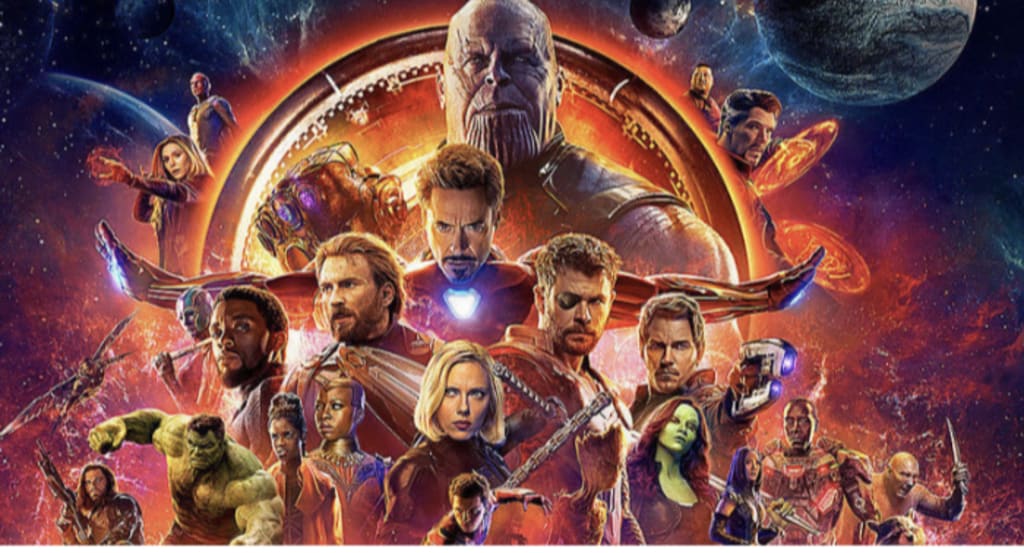The Marvel Cinematic Universe is the Most Cohesive and Effective Universe of any Genre
(Spoiler Warning)

This July, Marvel fans crowded dozens of movie theaters, eagerly awaiting the first installation of the franchise after “Iron Man” Tony Stark’s death in Avengers: Endgame. The movie was well received at the box office, earning a 90% on Rotten Tomatoes, and grossing $580 million in the first two weeks. The actor who plays Spider Man, Tom Holland, has only been in the Universe for 5 movies (out of 23), yet he’s made an emotional connection with viewers and become an immediate fan favorite. This is a high contrast with Sony’s Spiderman, whose last movie earned a 63% on rotten tomatoes and is generally known for being a boring and cliche franchise.
This disparity of praise between Marvel and Sony’s Spiderman and difference in reception has nothing to do with the character, or even the production company- the secret lies within Marvel’s complex and brilliant cinematic universe.
Compared to every other superhero or science fiction franchise, Marvel takes every installment, even seemingly benign “filler” movies, and connects them in a way that serves the overarching plot. With other franchises based around one character, such as the original Spiderman and the infamous Hunger Games, each new movie seems to have unnecessary conflict and comes off as choppy. We never see any character development or growth between movies. With every film, the stakes are raised so quickly and randomly that the characters are rarely given time to reflect on their experiences and emotions. With Marvel’s movie structure, we are given time to see the effects of character's actions on others lives and how their personalities change as a result of this. We see these effects when you least expect them- in movies not centered around a “serious” threat, a.k.a “filler movies”.
Filler movies’ goal is to focus on character development and to take a break from the seriousness of the main plot that strings each movie together. In Marvel’s case, this is Thanos: a supervillain set on destroying half the universe to stop overpopulation. A filler movie done right will not distract the viewer from the overarching plot- but provide a B-Plot, with characters that were previously ignored, which gives viewers time to digest the ramifications of the last movie, while enjoying some more lighthearted Marvel content.
A great example of this is in the characters “Hulk” and “Thor” in a recent Marvel filler movie, Thor Ragnarok. Although clearly a Thor movie, whose actions are canonical (actually occuring in the series) and would influence the events in later movies, (i.e Thor's home planet being completely destroyed and its people marooned on a spaceship- setting up their encounter with Thanos later), Ragnorok focuses more on the relationships Thor and Hulk have and how their motivations and powers have changed. With Thor, you get even more insight on his child-like, blase behavior, and how he uses it as a way to escape the literal “god-like” responsibilities he has. He would rather fight weak enemies and half heartedly work on his own than lead his people or fight alongside the Avengers. The movie forces Thor out of his comfort zone, destroying the last physical crutch he had- his hammer. This allows him to unlock special powers within himself, and preps him for EndGame by making him less self-motivated. With Hulk, in previous movies, you can see his emotional torment with him not being able to balance the two sides of himself, Hulk and Bruce Banner. This cumulates into him being unable to control himself and fighting Iron Man in Avengers: Age of Ultron- which ultimately gets him sent away and lost in space. Although Marvel could’ve devoted another movie to him, Thor Ragnorok was supposed to focus on Thor’s turmoil, yet they reintroduced an uncontrollable Hulk- leaving Thor (who he wasn't even too close with at the time) to remind him that he’s not just Bruce Banner or Hulk- he's uniquely both, and doesn't have to suppress one or the other. This also primes Hulk for Endgame- temporarily ending his internal conflict and preparing him for his one-on-one fight with Thanos. Throughout the movie, we’re given comedic breaks as well, reminding us that it’s not another “fate of the world” scenario, it's a silly movie to explain Hulk and Thor’s characters, and why they were absent in previous movies. Every action still matters and affects the plot, but is not as heavy or dramatic- which is a relief.
This strategy Marvel uses works great in referencing older movies and moving the plot forward in an elegant way, but also makes sure that the relationships between each character are defined. Each super hero intertwines with one another- they come together when it makes sense and fight when their feelings are hurt. The biggest problem with other cinematic universes such as DC is that their content is extremely formulaic and disjointed. At the end of each movie, the characters learn nothing about themselves, show little reflection, and the threat is always specific to the character. When crossover movies like Justice League are created in these universes, the characters cannot grow together. The movie ultimately fails because it seems like just a bunch of individual superheroes forced to fight crime together one time, and never have it mentioned again- similar to a group project you don't want to do. In the Marvel Cinematic Universe, the movie feels like humans with emotions who also happen to have superpowers- evolving together and learning how to use each other’s strengths and work with different situations.
New themes get tested in the Marvel Cinematic Universe never seen before in superhero movies. They explore themes like government interference in superhero business when too many civilians get hurt in the crossfire. They also create laws concerning when you can use powers and when you can't, ads and merchandise made for superheroes, their civilians over glorifying them, and recently in Spiderman: Far From Home, what happens when people look to superheroes more than traditional law enforcement.
The Marvel Cinematic Universe is able to kill one of its most loved and longest standing characters (Tony Stark) because it makes sense to the story and the threat that’s been building up, Tony Stark has been given time to develop so his choice to sacrifice himself makes sense, and most importantly, the grief the world and his fellow superheroes feel is palpable in the latest movie. It drives the plot, gives a sense of permanence and doesn't seem like a cheap way to shock the audience.
Spiderman: Far from home did not disappoint, showing how deeply Peter Parker feels for Tony, and how his death affected him and the world. It sets the tone for a slew of new movies to come such as Dr.Strange 2 and a new Black Widow movie. If it's anything like the Marvel I know, be sure to bring some tissues, and count down the days until the next installment comes.






Comments
There are no comments for this story
Be the first to respond and start the conversation.